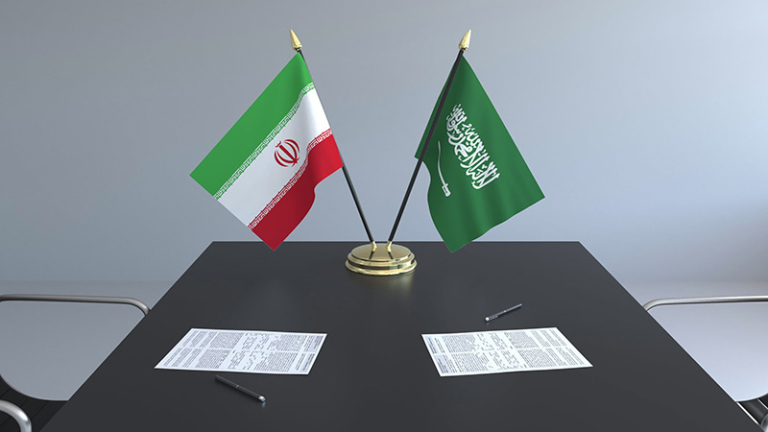
During his years in the Nixon White House in the 1970s, former Secretary of State Henry Kissinger sought to manage the US-Soviet rivalry by creating arenas of engagement he hoped would advance the American effort to contain Moscow’s regional and global ambitions. The Soviet Union’s aims were no different. For both countries, the goal of détente, as the French word signifies, was to “relax tensions” while sustaining competition.
The recent if still nascent quest of Iran and Saudi Arabia to move from a cold conflict (and sometimes hot, if indirect) to détente also points to a diplomatic strategy whose ultimate purpose is to win time and maximum advantage. Tehran and Riyadh could reap strategic, diplomatic, and economic advantages from not only reestablishing diplomatic relations but also from initiating talks designed to find some common ground on a host of issues, not least of which is the war in Yemen and the role Houthi forces play.
But given its regional posture—and the widespread (if probably erroneous) perception that following the withdrawal from Afghanistan a US departure from the Gulf is now inevitable—Iran seems well positioned to maneuver talks with Riyadh to its advantage. Iran’s recent request that the two countries reopen their consulates in Mashhad and Jeddah, as a “sign of good will,” before any move to end the war in Yemen underscores Tehran’s confidence. It also suggests that despite the hopes of some western leaders that Saudi-Iranian talks could be a game changer, the prospects for significant diplomatic progress will remain modest. This outcome could ultimately be acceptable—or at least tolerable—to both Riyadh and Tehran.
Tactics and Strategy
Two seemingly contradictory but ultimately compatible logics are driving the recent efforts to advance détente between Iran and Saudi Arabia. The first is the logic of improvisation: the leaders of both countries are making it up as they go along. Their chief concern being regime survival, they must demonstrate a capacity for adaptability at home and abroad. Such tactical concerns present Iranian leaders with the task of forging consensus on the key foreign policy challenges. This is no simple matter because on several vital issues, not least of which is the Joint Comprehensive Plan of Action (JCPOA), there seems to be no small amount of confusion. It is therefore wise for the new and largely untested leadership team in Tehran to keep juggling several balls, one of which is the Saudi question.
It is wise for the new and largely untested leadership team in Tehran to keep juggling several balls, one of which is the Saudi question.
For Riyadh, forging consensus is perhaps less complicated because there is only one voice that really matters: that of Crown Prince Mohammed bin Salman (MbS). But he has far less political and geostrategic room to maneuver than his Iranian counterparts. In the immediate neighborhood, Saudi Arabia still faces a determined Houthi enemy, while in the wider global arena, Riyadh is yet to figure out its relations with the Biden Administration (and vice versa). By contrast, Tehran has diplomatic, strategic, and economic assets throughout the Middle East. Moreover, it might be prepared to forgo the effort to save the JCPOA and focus its sights on consolidating its array of relationships in the wider region and beyond. Indeed, Iran has the upper hand. And even if it does return to the negotiating table, it has opposed—and will continue adamantly to resist—linking these talks to its regional strategic posture.
This imposing reality brings us to the second logic, and that is strategic. Iran’s leaders have long shared the conviction that the ultimate objective of Tehran’s regional and global enemies is to lay economic, diplomatic, and (if need be) military siege to the Islamic Republic. This perception animates Tehran’s resolve to weaken the threat of “encirclement” by forging a diverse set of relationships that give Iran the capacity to impose varying degrees of pain on its opponents. Riyadh views this strategy as offensive rather than defensive. In its bid to deter what Riyadh sees as Iran’s “expansionist” or hegemonic aspirations, it has depended on the US military umbrella. Riyadh’s escalation of the war with the Houthis signaled a bid by MbS to push back against Iran by striking at its closest regional ally.
But the policy has backfired, thus signaling not only the limits of Saudi Arabia’s military might but also the absence of any coherent strategy for addressing Iran. That Riyadh is improvising on both the tactical and strategic levels gives Iran a real advantage that Saudi Arabia is unlikely to remedy, even if it tries to compensate by bandwagonning on the “Abraham Accords” between Israel, the Emirates, Bahrain, and Morocco (and Sudan, although that agreement may now be in jeopardy following the recent coup).
Iranian Hard-liners Try to Figure It Out
With the Supreme Leader Ayatollah Ali Khamenei at the helm and President Ebrahim Raisi and Foreign Minister Hossein Amir-Abdollahian manning the sails and rudder, it is reasonable to expect that Iranian foreign policy should reflect a common map and course trajectory. The perception that Iranian hard-line leaders are united—and thus able to respond more coherently to the diplomatic challenges, in contrast to the divided government of former President Hassan Rouhani—has apparently played a role in motivating Saudi leaders to pursue talks with Tehran.
If Iran’s foreign policy team agrees on the big picture, it appears that they have been improvising—and perhaps disagreeing—when it comes to key foreign policy decisions, including the fate the JCPOA.
Still, if Iran’s foreign policy team agrees on the big picture, it appears that they have been improvising—and perhaps disagreeing—when it comes to key foreign policy decisions, including the fate the JCPOA. Over the past weeks, multiple signals about when and whether Tehran might rejoin the Vienna talks have prompted criticism from various quarters, including the reformist oriented Aftab-e Yazd newspaper, whose chief editor on October 18 complained of a “confusing policy.” The economic newspaper Jahan-e Sanat offered a similar assessment when it argued that the government had created “nuclear confusion.” Adding salt to the wound, a senior member of the Iranian Majlis has asserted that the foreign minister’s policy echoed the “action for action” approach that Iranian hard-liners criticized during the last months of the Rouhani government.
Beyond the domestic arena, these criticisms of Tehran’s improvised diplomacy will surely shape the perceptions of key regional and global players. After all, whether Iran ultimately decides to pursue the JCPOA talks is of no small consequence for Iran’s friends and foes alike. Echoing this point, Russia’s envoy to the Vienna talks has openly criticized Iranian leaders for promising to return to the talks “soon.” What, he asked, can that “mean in practical terms?”
For Saudi Arabia, the answer is critical. If a return to the talks—which Iranian leaders have now suggested is possible—leads to a revived JCPOA that provides for removing nuclear related sanctions, and yet offers no provisions for wider talks on regional security, Tehran’s leverage in any talks with Riyadh will be greatly enhanced. Saudi Arabia could thus be under increased pressure to make concessions on vital issues such as the Houthi campaign in Yemen. By contrast, if the nuclear talks fail to materialize and US-Iranian tensions increase, Riyadh might be under less pressure from Washington to pursue diplomacy with Tehran or to revive talks with the Houthis. Still, given Iran’s strategic presence in the region and recent Houthi military advances in Yemen’s energy-rich regions of Shabwa and Marib, a failure of diplomacy would not necessarily work to Riyadh’s advantage.
Yemen, the JCPOA, and the Diplomatic Waiting Game
Reiterating Iran’s confidence, Abbas Neil Foroshan, who serves as the assistant for operational affairs in the Islamic Revolutionary Guard Corps (IRGC), stated on October 14 that Saudi Arabia has no choice but to negotiate a conclusion of the Yemen war. Because the “enemy,” he declared, “cannot defeat the Yemeni resistance front,” the “wisest way is to reach a peaceful agreement.” Not surprisingly, the Saudi position is that Iran must first end its support for Houthi militias before any meaningful talks between Tehran and Riyadh could advance.
The Saudi position is that Iran must first end its support for Houthi militias before any meaningful talks between Tehran and Riyadh could advance.
Presumably, the two sides began staking out these positions during their September 21st meeting at Baghdad’s international airport. With Iraq continuing to serve as the crucial mediator, reports suggest that Saudi and Iranian diplomats created a tentative framework for addressing the Yemen conflict. But as one analyst notes, Iran “still has to prove it has real influence over the Houthis—at least enough to make them sit down for peace talks.” If, as suggested here, Tehran’s capacity to push Houthi forces to the negotiating table were in fact limited, its capacity to leverage the Yemen conflict for its strategic advantage may also be constrained. This prospect will surely influence the calculation of Saudi leaders, who will wonder if Tehran has the political will or even the means to deliver on the Houthis.
The significance of these contending calculations will ultimately rest on the course of US-Iranian relations and the fate of the JCPOA. Recent statements by Iranian negotiators that talks will resume in Vienna by the end of November could indicate a real desire to get back to the negotiating table. They could also constitute a tactical maneuver designed to win Tehran time, now that it has been vigorously criticized by the International Atomic Energy Agency for further expanding its enrichment program in ways that the head of the IAEA has warned could lead to a total breakdown of the United Nations’ monitoring mechanism of Iran’s nuclear facilities. This prospect surely helps to explain the White House’s cautious, if not skeptical, response to the recent statement by Iranian officials. As noted above, Iranian leaders are still trying to work out where they ultimately stand on this crucial question.
Treading Water
At the end of the day, both Iran and Saudi Arabia will benefit from a process of détente which, if it advances, could provide substantial economic benefits. Paradoxically, a return to the JCPOA talks—and along with that, the prospects for increased Iranian oil exports—may be putting an end to a recent oil rally that had sent the price of crude oil to $85 a barrel. At the same time, if talks restart and advance, then Iran might also increase its exports. Yet if Iran might have much to gain from a sustained effort to advance the Vienna talks, its hard-liner government remains profoundly—and perhaps understandably—skeptical that the Biden Administration would honor any commitments it makes at the negotiating table.
Thus, whether by design or default, the confusion occasioned by the various promises and statements made by Iranian leaders on the JCPOA talks works far more to the favor of Tehran than Riyadh. As they try to make up their minds and keep their options open, Iran’s hard-liners could create more space to maneuver by pursuing a détente with Saudi Arabia that might very well go nowhere fast. Hoping to end the conflict in Yemen but unsure of whether this could really happen, Saudi leaders also have an interest in relaxing relations with Tehran. At the very least, an incremental process of détente might lower political and strategic temperatures in the Gulf while winning a measure of support from western leaders. In the Gulf, as elsewhere, détente is more about managing rather than transcending conflicts.

